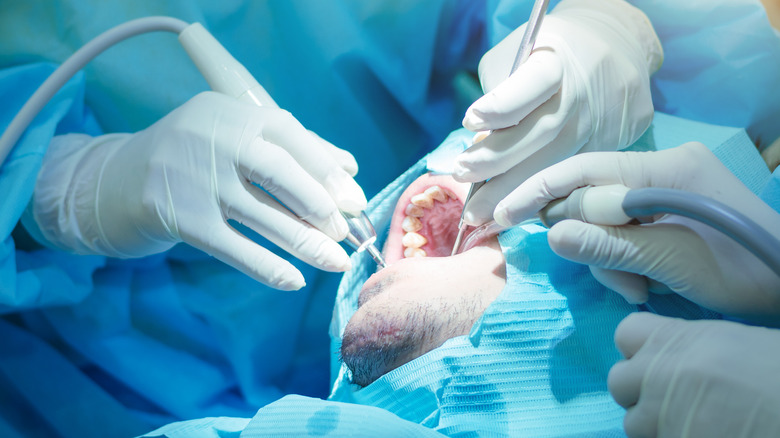What Really Happens If You Don't Get Your Wisdom Teeth Removed
Just like losing your first tooth or getting your braces, having your wisdom teeth removed feels like yet another dental rite of passage. For some, wisdom teeth removal may not be necessary if they're healthy, properly positioned, and fully grown in (via Bixby Knolls Dental Group). For most others, however, the space in the back of the mouth is minimal and limits the proper growth of wisdom teeth. While the idea of dental surgery may make us cringe, delaying or forgoing the care of our wisdom teeth altogether can lead to more severe problems down the line.
If so many of us need our wisdom teeth removed, then why exactly are they there in the first place? According to Smiles on Michigan, our wisdom teeth, otherwise known as our third molars, once had more space to grow. It's believed that the human jaw progressively shrank over time, but that wisdom teeth were once crucial for the crushing and tearing of food before humans moved toward diets consisting of softer foods. Wisdom teeth removal may not seem urgent if they're not actively causing pain, but eventually, that may not be the case.
Healing after wisdom teeth surgery
Odds are, you will probably need your wisdom teeth removed at one point or another, as 90% of Americans undergo wisdom teeth removal (via David Rizk, DDS). Neglecting to have them removed can affect the physical appearance of your teeth, leaving them looking crooked and jam-packed. Wisdom teeth often get stuck below the gum line. If they do emerge, they can sometimes grow in sideways. In both instances, this can cause serious discomfort. If lodged below the gums, the lack of open exposure makes these teeth particularly difficult to access with a toothbrush, leaving us susceptible to decay and infection.
Even if your wisdom teeth are not currently bothering you, it's best to go ahead and schedule your dental surgery as soon as your dentist recommends it. While the average 2 weeks of recovery time isn't exactly fun, Medical News Today offers some tips to help ease the healing process. Rinsing with an antiseptic mouth wash will prevent infection while rinsing with a mixture of salt and warm water can ease gum discomfort. Additionally, sleeping with your head elevated at night will help reduce pain. Be sure to avoid hot beverages, chewy foods, smoking, alcohol use, and drinking from a straw.
The goal is to keep the area clean and prevent any food debris from getting into the site while it heals. Your dentist will provide you with specific recovery instructions immediately after surgery, as well as in the coming days.


